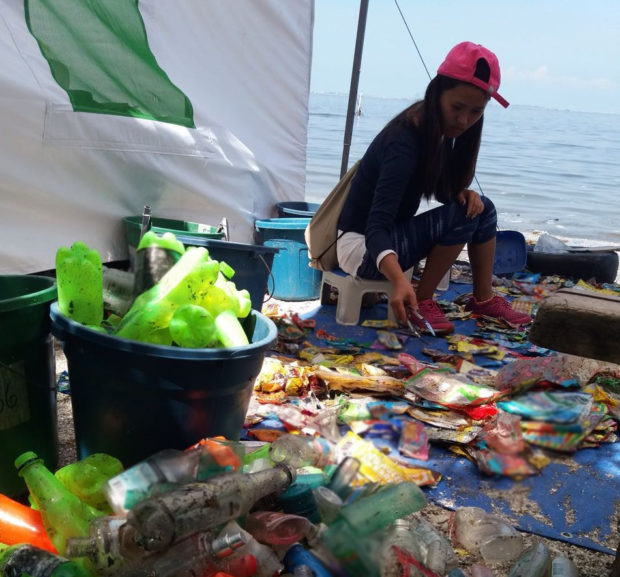
Recyclables, such as pet bottles, were among the trash recovered during the cleanup in Freedom Island. If segregation and recycling were done at source, these materials would not have found their way into the bay. Photo by GAIA
Environmental groups have called out multinational companies to stop “conveniently” faulting the public and take responsibility for the worsening pollution of seas and water systems in the country.
The Global Alliance for Incinerator Alternatives (GAIA) demanded on Friday that companies should immediately implement the use of environment-friendly packaging in their products and implored the government to decisively enforce the Ecological Solid Waste Management Act (Republic Act 9003) to resolve the water pollution and waste crisis.
“It is already bad enough that these companies are pushing products and packaging that are polluting our oceans and waterways. It’s even worse that they and government officials tasked with protecting our natural resources and safeguarding public health are promoting wrong solutions to the waste crisis, particularly, incineration technologies,” said Anne Larracas, managing director for GAIA-Asia Pacific.
According to Larracas, incineration technologies are not the solution to the country’s waste problem, even reminding that such method is prohibited under the law.
“Incineration is not a short-term or long-term solution. You can’t solve this problem by building multi-million dollar facilities to be subsidized by public funds that will just transform solid waste into another toxic pollution problem. Doing so will just create more problems,” Larracas said.
In a clean-up drive organized by GAIA, Greenpeace, Ecowaste Coalition, Health Care Without Harm, and Mother Earth Foundation from September 11 to 20, hundreds of volunteers collected more than 50,000 pieces of plastic waste in Freedom Island, Manila.
The clean-up activity revealed that much of the garbage gathered were plastic packaging from six of the top 10 multinational brands.
“The companies that pollute our seas are the very same companies that have burdened communities with waste that can neither be composted nor recycled,” said Froilan Grate, regional coordinator for GAIA-Asia Pacific.
“We are calling on companies to use materials in their products and packaging that can be truly recovered, reused and recycled, and to invest in alternative delivery systems that will deliver their products to the public without the need for low-value, disposable packaging,” he added.
Grate said criticized the companies that “conveniently blame” their consumers for the plastic pollution, when their products are “almost impossible to manage.”
“Companies are only too happy to pass on to cities and the public the responsibility of addressing the waste that their products create,” he claimed.
The groups reiterated that the government should finally impose RA 9003, which bans incineration, decentralizes waste management from the city to the barangay (village), requires waste separation at source and door-to-door collection, and provides for the creation of materials recovery facility in every community for composting and storage of residuals and recyclables.
The Philippines is the first and the only country in the world with a national ban on incineration, following the passage of two landmark laws nearly 20 years ago: RA 9003 and the Philippine Clean Air Act (Republic Act 8749). /kga